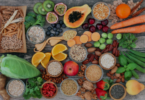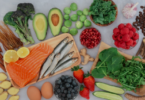Maintaining good gut health is essential for overall well-being, as it directly impacts digestion, nutrient absorption, immunity, and even mental health. Incorporating gut-friendly foods into your diet can work wonders for improving digestion and keeping your digestive system in top shape. Here’s a list of the best foods to enhance gut health and digestion, with explanations on how they benefit your body.
1. Yogurt
Yogurt is rich in probiotics, which are live bacteria that promote a healthy gut microbiome.
- Benefits: Improves digestion, strengthens the immune system, and helps reduce symptoms of irritable bowel syndrome (IBS).
- How to Consume: Choose unsweetened, plain yogurt for maximum benefits. Add fresh fruits or a drizzle of honey for natural sweetness.
2. Kimchi and Sauerkraut
These fermented vegetables are loaded with probiotics and fiber, making them excellent for gut health.
- Benefits: Boosts healthy bacteria in the gut, aids in digestion, and reduces inflammation.
- How to Consume: Use them as a side dish or add to salads, sandwiches, or rice bowls.
3. Bananas
Bananas are a powerhouse of prebiotics, which feed the good bacteria in your gut.
- Benefits: Helps restore gut flora, reduces bloating, and promotes regular bowel movements.
- How to Consume: Enjoy bananas as a snack, in smoothies, or sliced over cereal.
4. Ginger
Ginger is a natural remedy for various digestive issues.
- Benefits: Relieves nausea, reduces gas, and supports efficient digestion.
- How to Consume: Brew ginger tea, add grated ginger to dishes, or use in fresh juices.
5. Whole Grains
Whole grains such as oats, quinoa, and brown rice are high in fiber, aiding digestive health.
- Benefits: Prevents constipation, promotes the growth of beneficial gut bacteria, and stabilizes blood sugar.
- How to Consume: Replace refined grains with whole-grain options in meals.
6. Garlic and Onions
These vegetables contain prebiotics that help nourish the good bacteria in your gut.
- Benefits: Enhances digestion, supports the immune system, and fights harmful bacteria.
- How to Consume: Add to soups, stir-fries, or as seasoning in your favorite dishes.
7. Apples
Apples are rich in pectin, a type of soluble fiber that acts as a prebiotic.
- Benefits: Helps bulk up stool, promotes regularity, and supports gut bacteria.
- How to Consume: Eat them raw, baked, or as part of a healthy dessert.
8. Chia Seeds and Flaxseeds
Both seeds are excellent sources of fiber and omega-3 fatty acids, promoting a healthy gut.
- Benefits: Eases constipation, reduces inflammation, and supports gut lining health.
- How to Consume: Add to smoothies, oatmeal, or yogurt for a nutrient boost.
9. Bone Broth
Bone broth is a nutrient-rich liquid full of collagen, gelatin, and amino acids.
- Benefits: Heals and strengthens the gut lining, reduces inflammation, and aids in digestion.
- How to Consume: Drink as a warm broth or use as a base for soups and stews.
10. Leafy Greens
Spinach, kale, and other leafy greens are packed with fiber and essential nutrients.
- Benefits: Encourages the production of gut-friendly bacteria and supports digestion.
- How to Consume: Add to salads, smoothies, or sauté as a side dish.
Tips for Gut Health
- Drink plenty of water to aid digestion and prevent constipation.
- Avoid highly processed and sugary foods, as they can disrupt gut bacteria.
- Incorporate a variety of foods to ensure a diverse gut microbiome.
- Stay active—regular exercise can improve gut health.
Incorporating these foods into your diet can lead to noticeable improvements in your digestion and overall gut health. With consistent effort, you’ll feel lighter, healthier, and more energized!
Share your thoughts! Which of these foods are already a part of your diet? Let us know in the comments below! If you found this post helpful, feel free to share it with friends and family.







